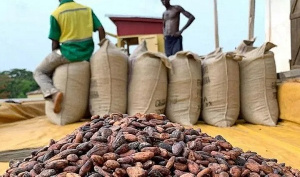 Even though the season is not over, this will be the highest production recorded
Even though the season is not over, this will be the highest production recorded
Information available to The Finder indicates that Ghana has produced the highest volume of cocoa beans in history, exceeding over one million metric tonnes with over 10 weeks left until the end of the season.
1,030,000 metric tonnes
Data on the grading of beans by Quality Control Company of COCOBOD sighted by The Finder shows that with just two weeks to go in the light crop season, the board has recorded over one million (1,030,000) metric tonnes.
Even though the season is not over, this will be the highest production recorded in the country’s production history. This figure is expected to be higher by the close of the season.
1,024,000 metric tonnes in 2010/11 season
Prior to this new record, the highest production of a little over one million (1,024,000) metric tonnes was recorded in the 2010/11 season.
Manifesto promise fulfilled
This is a fulfilment of the New Patriotic Party’s (NPP) manifesto promise to push annual cocoa output above one million metric tonnes when it takes power in January 2017 under President-elect Nana Akufo-Addo, using a series of fresh measures.
When contacted, the management of the Ghana Cocoa Board (COCOBOD) will neither deny nor confirm the record-breaking achievement.
The result of intervention productivity enhancement programmes
This ground-breaking record is largely attributed to intervention productivity enhancement programmes rolled out by the board.
The programmes include national mass pruning, mass pollination and fertiliser policy that ensures fertiliser is distributed through farmer cooperatives
Also, the introduction of various agronomic interventions by the government is helping to bring a tremendous increase in crop yields per acre on cocoa farms.
Similarly, the introduction of the mass pruning of cocoa farms, hand pollination, and right application of fertilisers to the tree crop, among other things, aided the increase in production.
The new policies also include re-tooling and deepening of the Cocoa Disease and Pest Control Programme (CODAPEC); streamlining of the HI-TECH Programme to ensure equal access to fertilizers and other farm inputs; facilitating the formation of cocoa farmer groups and cooperatives across the country, which have seen more than 3,000 of them registered with the Department of Co-operatives.
It also involves the introduction of motorized weed slashers and pruners, also a new policy and the enhanced cocoa rehabilitation programme.
Hand pollination has led to an increase in the pods a single cocoa tree bears
The hand pollination had led to an increase in the pods a single cocoa tree bears at a time, thus per the COCOBOD’s estimation, a single tree could give a farmer almost 32 kilos of cocoa, which is half of a bag.
Cocoa cultivation under irrigation system is promising
Currently, the results from the pilot of cocoa cultivation under an irrigation system is promising.
7,000 kilogrammes per acre
Farmers in the Western North Region involved in the pilot are recording as high as 7,000 kilogrammes per acre.
All year round harvesting
Aside from farmers achieving optimal yield under irrigation, they stand the chance of harvesting throughout the year without thinking of expansion that will contribute to deforestation.
Water is crucial for cocoa farming, and COCOBOD is focusing on pushing for cocoa production under irrigation for farmers.
US$600 million JICA, AfDB facility
The irrigation pilot project is part of activities under the $600 million syndicated loan from Japan International Cooperation Agency (JICA) and the African Development Bank under the Enhanced Private Sector Assistance for Africa initiative.
Rehabilitation of aged and disease-infected farms
Initiatives under the facility included the allocation of financing to sustainably increase cocoa plant fertility and rehabilitate aged and disease-infected farms.
COCOBOD receives ISO certification
The Quality Control Company (QCC), a subsidiary of the Ghana Cocoa Board (COCOBOD), received certification for global quality and standards for cocoa products from the country.
The ISO certification 17020 and 17025 was acquired through the support of the Ministry of Trade and Industry, the United Nations Industrial Development Organisation, and the Swiss government.
The new certification makes Ghana the only country in the region with such a level of accreditation.
The cocoa sector accounts for 4.5% of Gross Domestic Products (GDP) and contributes 25% of Ghana’s merchandise export earnings